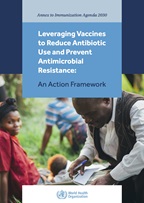
Vaccines for Antimicrobial Resistance (AMR)
Antimicrobial resistance (AMR) threatens the effective prevention and treatment of an ever-increasing range of infections caused by bacteria, parasites, viruses and fungi.
AMR occurs when bacteria, viruses, fungi or parasites change over time and no longer respond to medicines making infections harder to treat and increasing the risk of disease spread, severe illness and death. As a result, the medicines become ineffective and infections persist in the body, increasing the risk of spread to others.
Vaccines are an essential tool as part of a holistic response to reduce AMR. They prevent both drug-sensitive and drug-resistant infections, reduce the use and overuse of antimicrobials, and slow the emergence and spread of drug-resistant pathogens.
AMR - a significant global health threat
- Antimicrobial resistant pathogens kill more people annually than any single infectious disease.
- Nearly 5 million deaths were linked to AMR, including 1.4 million in South Asia and 1 million in Sub-Saharan Africa in 2019. (Source)
- Of the 5 million deaths linked to AMR — more than 1 million are in children aged under 5 years
- If unaddressed, AMR could impose up to US$ 3.4 trillion in gross domestic product (GDP) losses per year by 2030 (Source)
Estimating the impact of vaccines in reducing antimicrobial resistance (AMR) and antibiotic use
This report estimates the potential impact of vaccines on AMR reduction across 24 pathogens and 44 vaccines. It highlights how the impact of current vaccines could be amplified with increased coverage, and the potential of new vaccines that are still in the early developmental stages or are yet to be developed and introduced.
Globally, if current vaccines were used optimally and vaccine coverage reached 90%, vaccines could avert:
- up to 106 000 deaths
- 9.1 million Disability-adjusted life years
- US$ 861 million in hospital costs annually
- US$ 5.9 billion in productivity losses annually (all associated with AMR)
- And reduce antibiotic use by 142 million defined daily doses annually.
- While significant, this is a small fraction of the 5 million annual deaths linked with AMR. Thus, existing vaccines are not sufficient to combat AMR, and additional new vaccines are critically needed.
Estimating the impact of vaccines in reducing antimicrobial...
Dashboard
Resources
Related links and publications


/immunization-vaccines-and-biologicals-(ivb)/product-delivery-research-(pdr)/impact-on-amr-by-vaccine.tmb-1920v.png?sfvrsn=28f1f563_1 1920w)